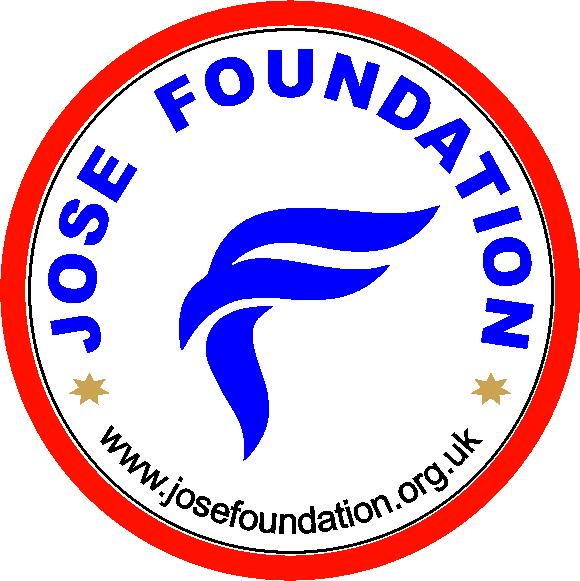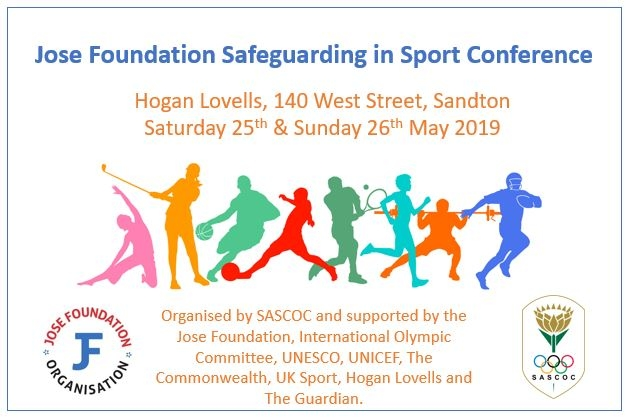Jose Foundation Safeguarding in Sport Conference
Organised by the South African Sports Confederation and Olympic Committee
Hosted at Hogan Lovells, 140 West Street, Sandton, 2196
25th – 26th May 2019
JOHANNESBURG DECLARATION ON SAFEGUARDING AGAINST HARASSMENT AND ABUSE IN PHYSICAL EDUCATION, SPORT AND RECREATION
WE, the delegates and representatives of the sport, recreation and physical education movement and its structures internationally, on the African Continent and in South Africa, present at the Safeguarding in Sport Conference, with the focus on the protection of all those who are involved in the sport, recreation, fitness, physical education and wellness sector, from abuse, harassment, neglect and non-accidental harm.
RECOGNISING that Sport is a fundamental right, as the right to play and to participate in sport has been embodied in United Nations (UN) instruments such as the Convention on the Rights of the Child; the Convention on the Elimination of all forms of Discrimination against Women and the Convention on the Rights of Persons with Disabilities, the UNESCO Charter on Sport, Physical Education and Physical Activity and the Kazan Action Plan. It is recognised as a right, which all Governments should make available to their people. All role-players in South African sport should fulfil their responsibilities in this regard.
That Commonwealth countries have affirmed that maximising the positive impact of sport in society requires collective action to promote good governance, protect human rights and especially safeguard all sport participants from abuse and non-accidental harm.
That one in three young South Africans have suffered sexual abuse. Recent research shows that 784 967 South African youth are likely to have been victims of sexual abuse by age 17, with 351 214 of the cases occurring in 2015 alone. This number would fill the Soccer City Stadium in Johannesburg eight times. As sport is a microcosm of society, these shocking statistics could very well be indicative of what may be occurring in the sport sector also.
The adverse effects of Gender Based Violence, emotional, physical and sexual harassment and abuse in sport and the risks they pose to participants, especially women, children, people with disabilities and the LGBTQI community in Sport.
COMMITTED to, supporting The United Nations Sustainable Development Goals (SDGs) that set out “the bold and transformative steps which are urgently needed to shift the world onto a sustainable and resilient path and seek to realize the human rights of all.”
SDG 16 envisages peaceful and inclusive societies that provide access to justice for all and effective, accountable and inclusive institutions. This goal specifically targets ending abuse, exploitation, trafficking and all forms of violence against children and significantly reducing all forms of violence.
Goal 5 of the SDG 5 seeks to achieve gender equality and empower all women and girls by 2030. It is also aims at eliminating all forms of violence against all women and girls in the public and private spheres, including trafficking and sexual and other types of exploitation. It also encourages countries to adopt and strengthen sound policies and enforceable legislation for the promotion of gender equality and the empowerment of all women and girls at all levels.
NOTING The African Union Agenda 2063 has the aspiration for the continent: An Africa whose development is people-driven, relying on the potential of African people, especially its women and youth, and caring for children.
It is envisaged that by 2063 all the citizens of Africa will be actively involved in decision making in all aspects. Africa shall be an inclusive continent where no child, woman or man will be left behind or excluded on the basis of gender, political affiliation, religion, ethnic affiliation, locality, age or other factors. All the citizens of Africa will be actively involved in decision making in all matters that affect them.
NOTING ALSO the determination by the African Union to continue the broader use of sport as a vehicle for development, integration and social cohesion, in particular focusing on youth, girls and women in Africa; as well as a tool for cooperation, solidarity, progress and the development of the continent.
NOTING FURTHER that the National Development Plan which is aligned to the United Nations Sustainable Development Goals (SDGs) aims to achieve: “By 2030, people living in South Africa should have no fear of crime. Women, children and those who are vulnerable should feel protected.”
MINDFUL that the National Sport and Recreation Plan envisions an Active and Winning Nation by 2030.
ACKNOWLEDGE THAT
The lack of physical education and participation in sport in schools has led to increased inactivity, obesity and socially deviant behaviour.
There is significant potential in South African sport to strengthen and enhance the leadership and corporate governance of sport to enhance the positive impact of sport in all sectors of the community. Sport and recreation activities should be more inclusive of marginalised and vulnerable groups, especially women, the youth, the elderly, children, persons with disabilities and the LGBTQI community.
Coaches are an invaluable human resource and a system in sport and recreation on safeguarding against harassment and abuse should support and protect them also.
Children and participants must have a voice in all matters pertaining to their welfare and safety.
Safeguarding against harassment and abuse in sport and recreation should be central to protecting the rights and welfare of all participants, advancing the integrity of sport and ultimately maximising the positive impact of sport. It should be central to the governance, management, delivery and funding of sport.
CONCERNED ABOUT
The adverse effects of Gender Based Violence (GBV), bullying, harassment and abuse in sport and the risks they pose to all, especially women, children, people with disabilities and members of the LGBTQI community in Sport.
The lack of communication regarding safeguarding against harassment and abuse in the sector. Most people in the sector are not aware of safeguarding against harassment and abuse issues, policies and procedures and capacity building in this regard is essential.
The lag in implementation of policies and legislation by sport governing bodies and Government poses the risk of failing the safeguarding system. The justice system must uphold its responsibilities in ensuring reported cases are dealt with until completion.
BELIEVING THAT
Sport is a valuable tool to support and achieve a diverse range of national and global developmental priorities.
The power of sport in nation building, unity of purpose, and social cohesion is immense and evident in many countries.
The sport and recreation sector must be underpinned by a code of ethics that makes it universally respected for its high values and ethical behaviour.
THEREFORE RESOLVE AND DECLARE THAT:
Policy
- The Sports Confederation and Olympic Committee (SASCOC) shall lead civil society through the sports movement in “translating policy into action”.
- SASCOC shall prepare and circulate a policy, procedural and reporting framework for sport organisations that is coherent and harmonised with international governing body and continental policy and sport body guidelines and policies.
- All Sport Governing Bodies have a Safeguarding Policy outlining the responsibilities and preventative actions as well as processes following reporting of offences, and the relevant disciplinary procedures to be followed.
- SASCOC should lobby for a change in legislation to ensure that coaches are dealt with in the same way as educators in respect of sexual relationships with those in their care.
- The framework should encompass elements of the digital revolution (4th industrial revolution) that impact on safeguarding in sport, especially in so far as use of the internet, mobile devices, and social media for sexting and exchange of photographs and videos.
- The Safeguarding policy is applicable to all participants in the system at all levels. This includes administrators, coaches, technical officials, educators, team managers, volunteers, athletes, parents, medical and scientific personnel, facility managers, drivers, and all support personnel.
- All organisations should require that any person joining as a member or working there to sign a Code of Ethics and Code of Conduct.
Capacity building
- All sport organisations must take actions to create public awareness of the problem of Maltreatment, Abuse and Harassment in the context of sport.
- Safeguarding be addressed in all education and training programmes of participants and parents, including at tertiary institutions that prepare coaches, educators, sport managers, medical, scientific and health professionals and other support staff.
- Ensuring the provision of safe facilities and infrastructure and education and training for administrators, coaches, educators and technical officials to prevent them from becoming involved in any violence, maltreatment, sexual harassment and abuse.
- Sport organisations should provide training of safety protection officers and those responsible for conducting disciplinary hearings.
Systems
- Recruitment processes in sport must follow due diligence for potential employees regarding the clearances against the Sexual Offences Register and the Child Protection Register.
- Stakeholders should incorporate Safeguarding in sport and the sharing of examples of good practice and programmes in partnership with other organisations, within the domestic and international spheres.
- Take direct action to stop all forms of bullying, hazing or orientation that violate safeguarding standards in sport.
- All sport organisations and communities commit to withdrawing the constraints that restrict women, girls, children, LGBTQI members and people with disabilities from enjoying their full participation and benefitting themselves and society thereby.
- Quality Physical Education that is guided by the UNESCO Guidelines on QPE should be offered by all schools.
- Sport bodies must have a designated Child Protection officer.
- Sport bodies must provide guidance on accessing support and advice to anyone in their environment who have been bullied, harassed or abused in any form.
- All organisations offering sport opportunities must devise measures to assess and minimise risks to participants.
- All sport organisations should monitor and evaluate their compliance and effectiveness to safeguarding policies, procedures and relevant legislation.
Resource investments
- Applicants for financial and non-financial support for public resources should show evidence that the organisation is compliant with and implements safeguarding processes and procedures. In cases where applicants are not compliant to this requirement, such support should be withdrawn or not granted.
Monitoring and Evaluation
- Implementation of the policies and procedures shall be monitored continuously and evaluated periodically through scientific research.
- Monitoring, evaluation and reporting – collect national data and embed child protection statistics in national M & E frameworks including statistics on national sport bodies adopted and implemented quality assured policies and procedures, have a nominated child protection officer and number of trained coaches, administrators, officials and parents.
- A database of all reported cases of harassment and abuse shall be maintained and updated by all National Governing Bodies.
Commitment
- All role-players in sport and recreation commit themselves to the implementation of this Declaration and will align their strategic plans, constitutional, administrative and operational focus areas, including budgeting and allocation of resources accordingly.

